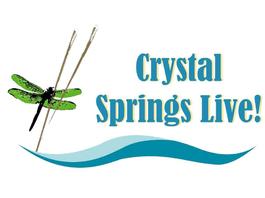Programs

Current Programs
Crystal Springs LIVE is our new interactive, VIRTUAL FIELD TRIP being offered by WaterVentures and Crystal Springs Foundation. This new program allows students to connect with experienced educators via Skype or Google Hangouts from the comfort of your classroom.
Minimum requirements for distance learning: internet connection fast enough to support Google Hangouts or Skype, a webcam with microphone (on a laptop/computer or stand alone), large display (large computer screen, projector, or TV). If you have questions about the technical aspect of this program please email Courtney, courtney@waterventures.us.
All about Alligators
In this interactive Virtual Field Trip, students will dive into the swampy world of Alligators! How do these modern day dinosaurs hunt, hide, and survive! Our instructor will guide students through an inquiry-based lesson that will include videos, real animal skulls, and live alligators!
Sunshine State Standards: SC.1.E.6.1, SC.2.L.17.2, SC.3.L.15.1, SC.4.L.17.4, SC.5.L.15.1, SC.5.L.17.1
Springs Around the World
Dive into the underwater world of water! Students will learn about the water cycle, the aquifer in Florida, and various springs around the world. Investigate how a spring works, and learn about our spring fed pond at Crystal Springs Preserve! Students will enter the underwater world of Florida's aquifer for an experience they will never forget!
Sunshine State Standards: SC.2.E.6.1, SC.4.E.6.3, SC.4.E.6.6, SC.4.L.17.4, SC.4.P.10.4, SC.5.E.7.2, SC.6.E.6.1, SC.6.E.6.2, SC.7.E.6.6
Think Outside the Trash
“Think Outside the Trash” will teach students how to keep our Florida environment clean! Your students will learn how trash gets into our waterways, and what we can do to keep it out. Students will get an in-depth look into the recycling process, and learn what they can recycle in their county. They will walk away with vital information that they need to be the next generation of water stewards in Florida.
Sunshine State Standards: SC.4.L.17.4, SC.4.E.6.3, SC.4.P.9.1
H20 On The Go
Florida is a very unique state when it comes to the water we use everyday! H20 On The Go explores the many different ways we can get our water. Students will learn about ground water, surface water, and salt water and how each type of water is an important resource for providing us with the fresh water we use everyday. This interactive virtual field trip will teach students that water is a finite resource and about the importance of conservation!
Sunshine State Standards: SC.4.E.6.6, SC.5.E.7.2, SC.7.E.6.6, SC.912.L.17.16, SC.912.E.6.2
Outrageous Raptors
Did you know that birds of prey are closely related to reptiles? Outrageous Raptors teaches students about the similarities between birds of prey and reptiles, adaptations of birds of prey including their talons, feathers, beaks, and amazing eyesight! Students will see real animal skulls, and videos! We will also look at a number of different birds of prey that can be found in Florida!
Sunshine State Standards: SC.2.L.17.1, SC.2.L.17.2, SC.3.L.15.1, SC.4.L.17.4, SC.5.L.17.1
Sinkholes: Journey to the Land Down Under
This program will explore different types of sinkholes, how they are caused, and ways we can prevent them from happening! We will look at some fascinating sinkholes in Florida, plus some well known sinkholes in different parts of the world. Ready to explore what lies beaneth us? Book this program today!
Sunshine State Standards: SC.4.E.6.6, SC.6.E.6.1, SC.6.E.6.2
Click here to register for our VIRTUAL FIELD TRIP
(No reservations can be made for WaterVentures using the Crystal Springs LIVE calendar)
or email: courtney@waterventures.us!
NOTE: This is only for the VIRTUAL FIELD TRIP, Crystal Springs LIVE. All inquiries about booking the WaterVentures vehicle should email helen@waterventures.us.
For a full description of the Sunshine State Standards, Please see below:
SC.1.E.6.1
Recognize that water, rocks, soil, and living organisms are found on Earth's surface.
SC.2.E.6.1
Recognize that Earth is made up of rocks. Rocks come in many sizes and shapes.
SC.2.L.17.1
Compare and contrast the basic needs that all living things, including humans, have for survival.
SC.2.L.17.2
Recognize and explain that living things are found all over Earth, but each is only able to live in habitats that meet its basic needs.
SC.3.L.15.1
Classify animals into major groups (mammals, birds, reptiles, amphibians, fish, arthropods, vertebrates and invertebrates, those having live births and those which lay eggs) according to their physical characteristics and behaviors.
SC.4.E.6.3
Recognize that humans need resources found on Earth and that these are either renewable or nonrenewable.
SC.4.E.6.6
Identify resources available in Florida (water, phosphate, oil, limestone, silicon, wind, and solar energy).
SC.4.L.17.4
Recognize ways plants and animals, including humans, can impact the environment.
SC.4.P.10.4
Describe how moving water and air are sources of energy and can be used to move things.
SC.4.P.9.1
Identify some familiar changes in materials that result in other materials with different characteristics, such as decaying animal or plant matter, burning, rusting, and cooking.
SC.5.L.15.1
Describe how, when the environment changes, differences between individuals allow some plants and animals to survive and reproduce while others die or move to new locations.
SC.5.L.17.1
Compare and contrast adaptations displayed by animals and plants that enable them to survive in different environments such as life cycles variations, animal behaviors and physical characteristics.
SC.5.E.7.2
Recognize that the ocean is an integral part of the water cycle and is connected to all of Earth's water reservoirs via evaporation and precipitation processes.
SC.6.E.6.1
Describe and give examples of ways in which Earth's surface is built up and torn down by physical and chemical weathering, erosion, and deposition.
SC.6.E.6.2
Recognize that there are a variety of different landforms on Earth's surface such as coastlines, dunes, rivers, mountains, glaciers, deltas, and lakes and relate these landforms as they apply to Florida.
SC.7.E.6.6
Identify the impact that humans have had on Earth, such as deforestation, urbanization, desertification, erosion, air and water quality, changing the flow of water.
SC.912.L.17.16
Discuss the large-scale environmental impacts resulting from human activity, including waste spills, oil spills, runoff, greenhouse gases, ozone depletion, and surface and groundwater pollution.
SC.912.E.6.2
Connect surface features to surface processes that are responsible for their formation.